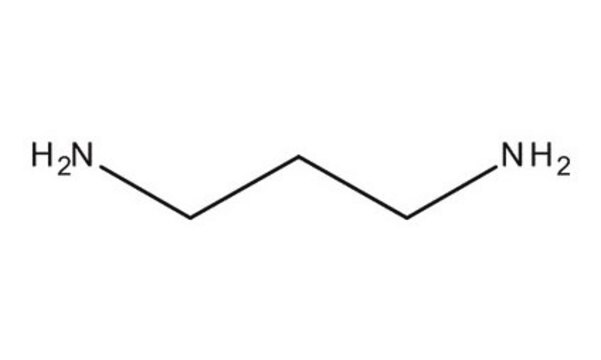D23602
1,3-Diaminopropane
≥99%
Synonym(s):
1,3-Propanediamine, DAP, TMEDA, Trimethylenediamine
About This Item
Recommended Products
vapor pressure
<8 mmHg ( 20 °C)
Quality Level
Assay
≥99%
form
liquid
autoignition temp.
662 °F
expl. lim.
15.2 %
refractive index
n20/D 1.458 (lit.)
bp
140 °C (lit.)
mp
−12 °C (lit.)
density
0.888 g/mL at 25 °C (lit.)
SMILES string
NCCCN
InChI
1S/C3H10N2/c4-2-1-3-5/h1-5H2
InChI key
XFNJVJPLKCPIBV-UHFFFAOYSA-N
Gene Information
rat ... Grin2a(24409)
Looking for similar products? Visit Product Comparison Guide
General description
Application
- Synthesis and Characterization of Bulky 1,3-Diamidopropane Complexes of Group 2 Metals (Be ‒ Sr).: Demonstrates the utility of 1,3-diaminopropane in the synthesis of metal complexes, enhancing the diversity and functionality of inorganic compounds, crucial for high purity chemical reagent applications (Jones et al., 2024).
- Rational engineering of homospermidine synthase for enhanced catalytic efficiency toward spermidine synthesis.: Explores the use of 1,3-diaminopropane as a precursor in enzymatic synthesis, optimizing biotechnological processes for polyamine production, pertinent to drug delivery system research (Liu et al., 2024).
- Hydroxyl-terminated dendrimers with sulfonimide linkers as binders for metals of industrial significance.: Investigates 1,3-diaminopropane′s efficacy in the synthesis of dendrimers, crucial for industrial applications in binding metals, thereby impacting industrial chemical manufacturing R&D (Abu Sbeih et al., 2024).
Signal Word
Danger
Hazard Statements
Precautionary Statements
Hazard Classifications
Acute Tox. 2 Dermal - Acute Tox. 4 Oral - Eye Dam. 1 - Flam. Liq. 3 - Met. Corr. 1 - Resp. Sens. 1B - Skin Corr. 1B - Skin Sens. 1B
Storage Class Code
3 - Flammable liquids
WGK
WGK 1
Flash Point(F)
122.0 °F
Flash Point(C)
50 °C
Personal Protective Equipment
Certificates of Analysis (COA)
Search for Certificates of Analysis (COA) by entering the products Lot/Batch Number. Lot and Batch Numbers can be found on a product’s label following the words ‘Lot’ or ‘Batch’.
Already Own This Product?
Find documentation for the products that you have recently purchased in the Document Library.
Our team of scientists has experience in all areas of research including Life Science, Material Science, Chemical Synthesis, Chromatography, Analytical and many others.
Contact Technical Service











